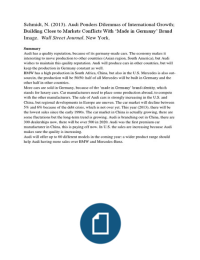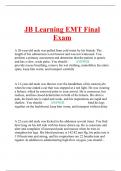Samenvatting
AIM Articles summary
-Schmidt, N. (2013). Audi Ponders Dilemmas of International Growth; Building Close to Markets Conflicts With ‘Made in Germany’ Brand Image. -Guler, I. & M. Guillén (2010). Home Country Networks and Foreign Expansion: Evidence from the Venture Capital Industry. -Johanson, J. & J. Vahlne (1977...
[Meer zien]





